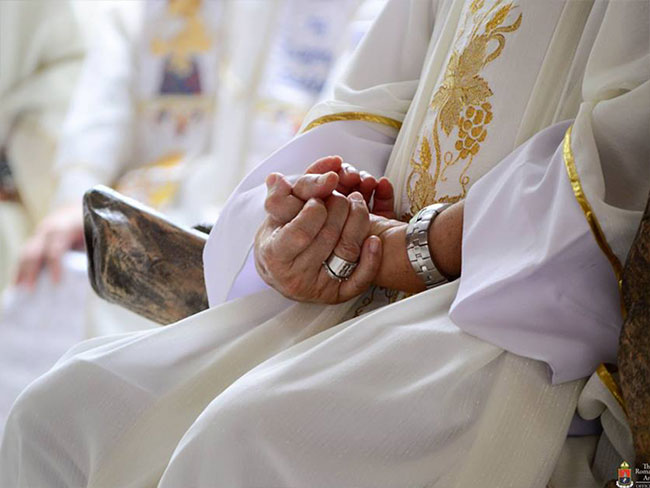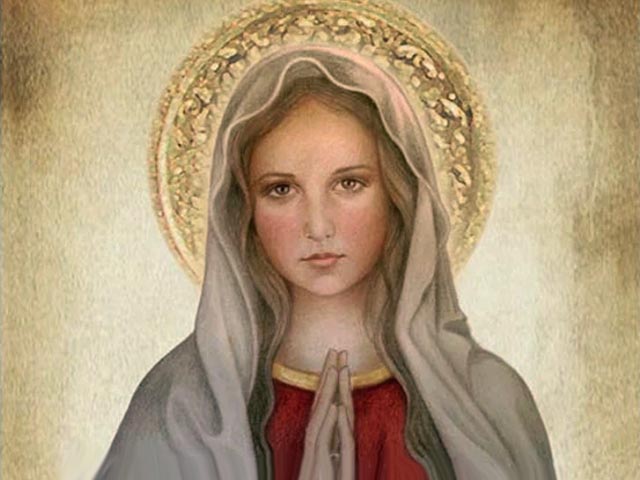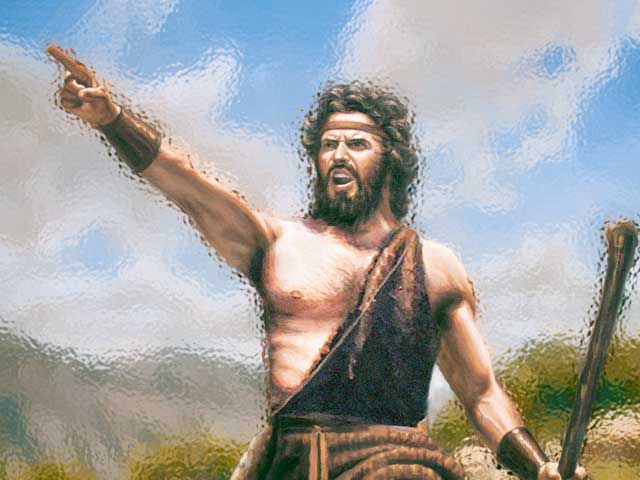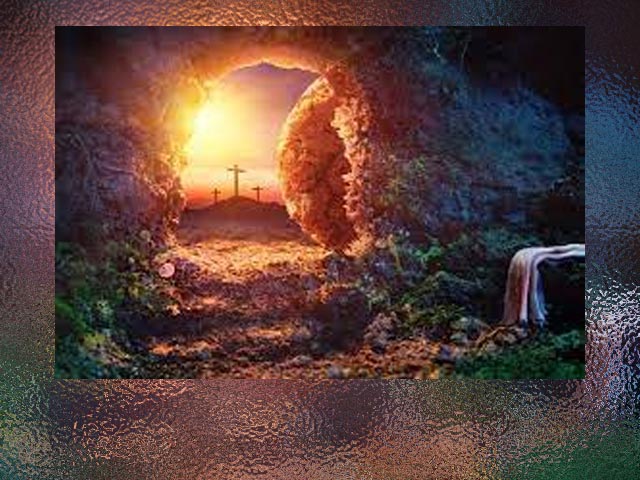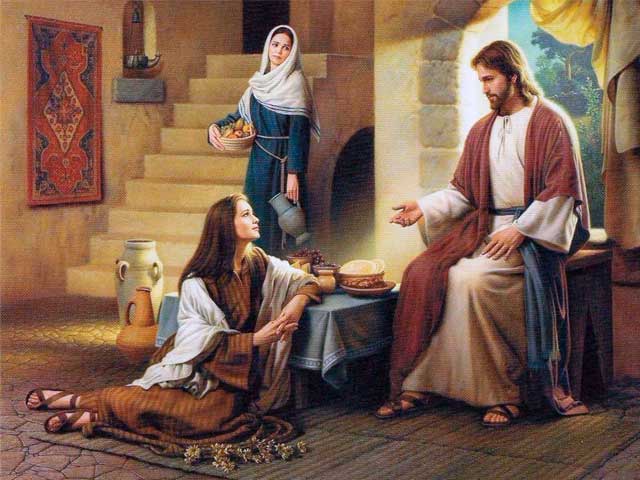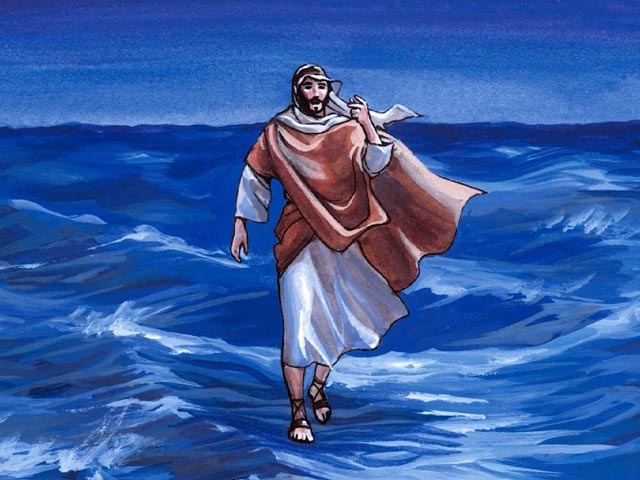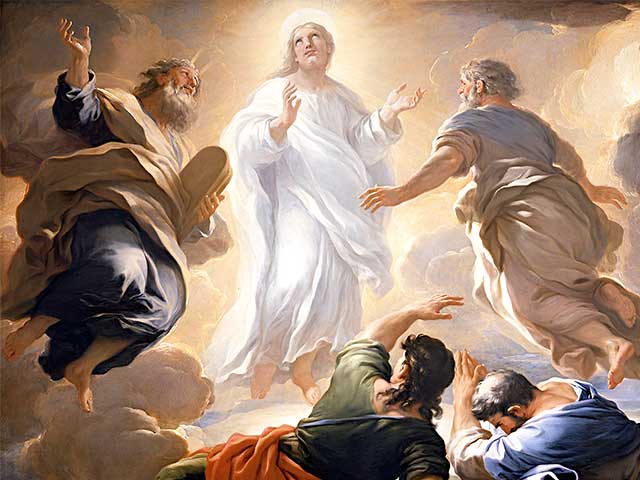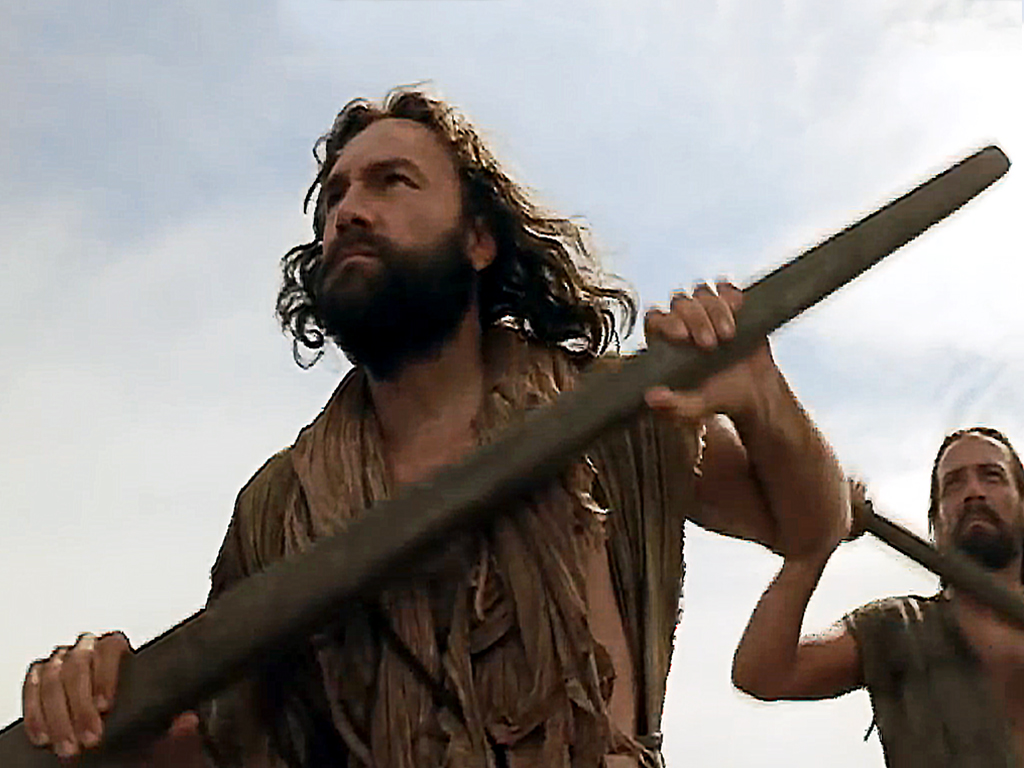Daily Readings Audio | Daily Meditation | March 16, 2020 – March 22, 2020
March 16, 2020
DAILY MEDITATION
by Daily reading & meditation website
Nghe đọc, Click vào đây
In the first reading Naaman, a leper from Syria, travels to Israel seeking healing from Elisha. In the Gospel, Jesus speaks to the people in the synagogue at Nazareth saying: Amen, I say to you, no prophet is accepted in his own native place. He explains this by referring to the story of Naaman, the only leper in all of Israel to be cured.
God alone brings true wholeness and fulfillment.
The story of Naaman the leper is important because, of all the lepers in Israel, he was the only one who was cured. He sought healing, and when his original destination for that healing was incorrect, he changed course and followed the commands in order to be healed. Many things draw our attention as being able to make us better, whether physically or emotionally. While these may be good, the only way to find wholeness is in God. Let us pray for our beloved dead, may perpetual light shine upon them and may they rest in peace. Amen.
Monday of the Third Week of Lent
Lectionary: 237
Nghe các bài đọc Anh ngữ tại đây
Reading 1 2 Kgs 5:1-15ab
Naaman, the army commander of the king of Aram,
was highly esteemed and respected by his master,
for through him the LORD had brought victory to Aram.
But valiant as he was, the man was a leper.
Now the Arameans had captured in a raid on the land of Israel
a little girl, who became the servant of Naaman’s wife.
“If only my master would present himself to the prophet in Samaria,”
she said to her mistress, “he would cure him of his leprosy.”
Naaman went and told his lord
just what the slave girl from the land of Israel had said.
“Go,” said the king of Aram.
“I will send along a letter to the king of Israel.”
So Naaman set out, taking along ten silver talents,
six thousand gold pieces, and ten festal garments.
To the king of Israel he brought the letter, which read:
“With this letter I am sending my servant Naaman to you,
that you may cure him of his leprosy.”
When he read the letter,
the king of Israel tore his garments and exclaimed:
“Am I a god with power over life and death,
that this man should send someone to me to be cured of leprosy?
Take note! You can see he is only looking for a quarrel with me!”
When Elisha, the man of God,
heard that the king of Israel had torn his garments,
he sent word to the king:
“Why have you torn your garments?
Let him come to me and find out
that there is a prophet in Israel.”
Naaman came with his horses and chariots
and stopped at the door of Elisha’s house.
The prophet sent him the message:
“Go and wash seven times in the Jordan,
and your flesh will heal, and you will be clean.”
But Naaman went away angry, saying,
“I thought that he would surely come out and stand there
to invoke the LORD his God,
and would move his hand over the spot,
and thus cure the leprosy.
Are not the rivers of Damascus, the Abana and the Pharpar,
better than all the waters of Israel?
Could I not wash in them and be cleansed?”
With this, he turned about in anger and left.
But his servants came up and reasoned with him.
“My father,” they said,
“if the prophet had told you to do something extraordinary,
would you not have done it?
All the more now, since he said to you,
‘Wash and be clean,’ should you do as he said.”
So Naaman went down and plunged into the Jordan seven times
at the word of the man of God.
His flesh became again like the flesh of a little child, and he was clean.
He returned with his whole retinue to the man of God.
On his arrival he stood before him and said,
“Now I know that there is no God in all the earth,
except in Israel.”
Responsorial Psalm 42:2, 3; 43:3, 4
R. (see 42:3) Athirst is my soul for the living God.
When shall I go and behold the face of God?
As the hind longs for the running waters,
so my soul longs for you, O God.
R. Athirst is my soul for the living God.
When shall I go and behold the face of God?
Athirst is my soul for God, the living God.
When shall I go and behold the face of God?
R. Athirst is my soul for the living God.
When shall I go and behold the face of God?
Send forth your light and your fidelity;
they shall lead me on
And bring me to your holy mountain,
to your dwelling-place.
R. Athirst is my soul for the living God.
When shall I go and behold the face of God?
Then will I go in to the altar of God,
the God of my gladness and joy;
Then will I give you thanks upon the harp,
O God, my God!
R. Athirst is my soul for the living God.
When shall I go and behold the face of God?
Verse Before the Gospel Ps 130:5, 7
I hope in the LORD, I trust in his word;
with him there is kindness and plenteous redemption.
Gospel Lk 4:24-30
Jesus said to the people in the synagogue at Nazareth:
“Amen, I say to you,
no prophet is accepted in his own native place.
Indeed, I tell you, there were many widows in Israel
in the days of Elijah
when the sky was closed for three and a half years
and a severe famine spread over the entire land.
It was to none of these that Elijah was sent,
but only to a widow in Zarephath in the land of Sidon.
Again, there were many lepers in Israel
during the time of Elisha the prophet;
yet not one of them was cleansed, but only Naaman the Syrian.”
When the people in the synagogue heard this,
they were all filled with fury.
They rose up, drove him out of the town,
and led him to the brow of the hill
on which their town had been built,
to hurl him down headlong.
But he passed through the midst of them and went away.
March 17, 2020
DAILY MEDITATION
by Daily reading & meditation website
Nghe đọc, Click vào đây
Optional Memorial Saint Patrick, Bishop
The first reading is the prayer of Azariah from the midst of the furnace, imploring the Lord to be faithful to his people and to accept their sacrifice of trust and fidelity. In the Gospel, Jesus tells the parable of the unforgiving servant, and how the master handles that servant. He says that the heavenly Father will treat them the same way unless they forgive others from their heart.
Faithfulness and forgiveness are marks of discipleship.
God calls us to be faithful, to follow him unreservedly and trust in his mercy. This requires steadfastness and courage on our part, along with humility and compassion. It can be hard to stay the course; it can be difficult to forgive one who has wronged us. The more we avail ourselves of God’s grace, the easier it is to live a way of life that marks us as faithful disciples. Let us pray for those in need of forgiveness and those who need to forgive others, may the Lord strengthen them in work of love to which they are called. Amen.

Tuesday of the Third Week of Lent
Lectionary: 238
Nghe các bài đọc Anh ngữ tại đây
Reading 1 Dn 3:25, 34-43
Azariah stood up in the fire and prayed aloud:
“For your name’s sake, O Lord, do not deliver us up forever,
or make void your covenant.
Do not take away your mercy from us,
for the sake of Abraham, your beloved,
Isaac your servant, and Israel your holy one,
To whom you promised to multiply their offspring
like the stars of heaven,
or the sand on the shore of the sea.
For we are reduced, O Lord, beyond any other nation,
brought low everywhere in the world this day
because of our sins.
We have in our day no prince, prophet, or leader,
no burnt offering, sacrifice, oblation, or incense,
no place to offer first fruits, to find favor with you.
But with contrite heart and humble spirit
let us be received;
As though it were burnt offerings of rams and bullocks,
or thousands of fat lambs,
So let our sacrifice be in your presence today
as we follow you unreservedly;
for those who trust in you cannot be put to shame.
And now we follow you with our whole heart,
we fear you and we pray to you.
Do not let us be put to shame,
but deal with us in your kindness and great mercy.
Deliver us by your wonders,
and bring glory to your name, O Lord.”
Responsorial Psalm 25:4-5ab, 6 and 7bc, 8-9
R. (6a) Remember your mercies, O Lord.
Your ways, O LORD, make known to me;
teach me your paths,
Guide me in your truth and teach me,
for you are God my savior.
R. Remember your mercies, O Lord.
Remember that your compassion, O LORD,
and your kindness are from of old.
In your kindness remember me,
because of your goodness, O LORD.
R. Remember your mercies, O Lord.
Good and upright is the LORD;
thus he shows sinners the way.
He guides the humble to justice,
he teaches the humble his way.
R. Remember your mercies, O Lord.
Verse Before the Gospel Jl 2:12-13
Even now, says the LORD,
return to me with your whole heart;
for I am gracious and merciful.
Gospel Mt 18:21-35
Peter approached Jesus and asked him,
“Lord, if my brother sins against me,
how often must I forgive him?
As many as seven times?”
Jesus answered, “I say to you, not seven times but seventy-seven times.
That is why the Kingdom of heaven may be likened to a king
who decided to settle accounts with his servants.
When he began the accounting,
a debtor was brought before him who owed him a huge amount.
Since he had no way of paying it back,
his master ordered him to be sold,
along with his wife, his children, and all his property,
in payment of the debt.
At that, the servant fell down, did him homage, and said,
‘Be patient with me, and I will pay you back in full.’
Moved with compassion the master of that servant
let him go and forgave him the loan.
When that servant had left, he found one of his fellow servants
who owed him a much smaller amount.
He seized him and started to choke him, demanding,
‘Pay back what you owe.’
Falling to his knees, his fellow servant begged him,
‘Be patient with me, and I will pay you back.’
But he refused.
Instead, he had him put in prison
until he paid back the debt.
Now when his fellow servants saw what had happened,
they were deeply disturbed, and went to their master
and reported the whole affair.
His master summoned him and said to him, ‘You wicked servant!
I forgave you your entire debt because you begged me to.
Should you not have had pity on your fellow servant,
as I had pity on you?’
Then in anger his master handed him over to the torturers
until he should pay back the whole debt.
So will my heavenly Father do to you,
unless each of you forgives your brother from your heart.”
For the readings of the Optional Memorial of Saint Patrick, please go here.
March 18, 2020
DAILY MEDITATION
by Daily reading & meditation website
Nghe đọc, Click vào đây
Optional memorial Saint Cyril of Jerusalem, Bishop and Doctor of the Church
In the first reading, Moses tells the people the statutes and decrees they must observe. In the Gospel, Jesus says that he has not come to abolish the law, but to fulfill it.
Christ is the fullness of goodness, truth and love.
Christ does not simply give us the instructions we need to choose the best good possible, he gives us his very self, his goodness and his truth, alive in our hearts and minds. Jesus came to fulfill the law by giving us all we need to follow it, and to choose the joy of unity with God. Let us pray for those oppressed by any evil in the world, may Christ bring about justice and sources of healing for them. Amen.
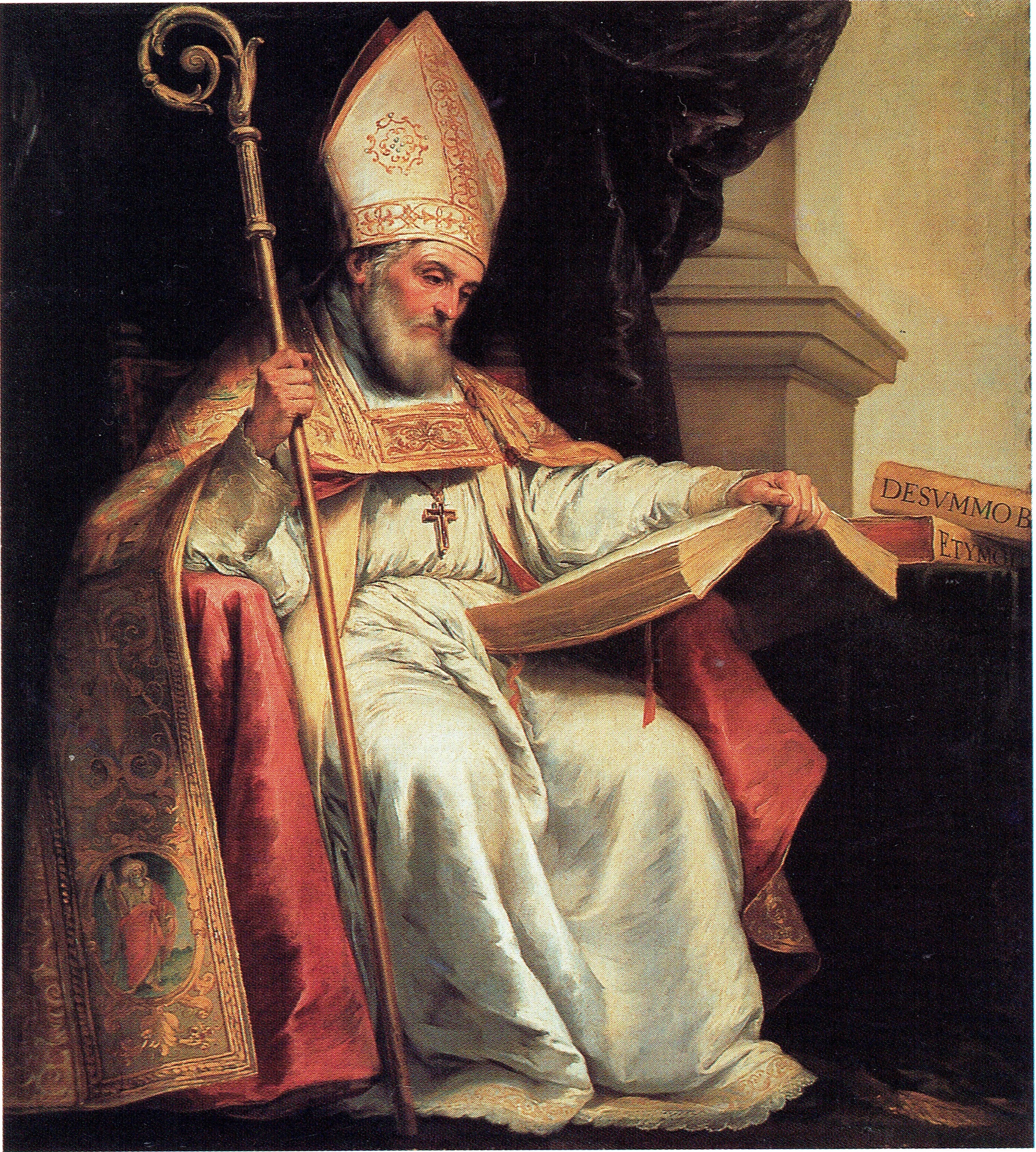
Wednesday of the Third Week of Lent
Lectionary: 239
Nghe các bài đọc Anh ngữ tại đây
Reading 1 Dt 4:1, 5-9
Moses spoke to the people and said:
“Now, Israel, hear the statutes and decrees
which I am teaching you to observe,
that you may live, and may enter in and take possession of the land
which the LORD, the God of your fathers, is giving you.
Therefore, I teach you the statutes and decrees
as the LORD, my God, has commanded me,
that you may observe them in the land you are entering to occupy.
Observe them carefully,
for thus will you give evidence
of your wisdom and intelligence to the nations,
who will hear of all these statutes and say,
‘This great nation is truly a wise and intelligent people.’
For what great nation is there
that has gods so close to it as the LORD, our God, is to us
whenever we call upon him?
Or what great nation has statutes and decrees
that are as just as this whole law
which I am setting before you today?
“However, take care and be earnestly on your guard
not to forget the things which your own eyes have seen,
nor let them slip from your memory as long as you live,
but teach them to your children and to your children’s children.”
Responsorial Psalm 147:12-13, 15-16, 19-20
R. (12a) Praise the Lord, Jerusalem.
Glorify the LORD, O Jerusalem;
praise your God, O Zion.
For he has strengthened the bars of your gates;
he has blessed your children within you.
R. Praise the Lord, Jerusalem.
He sends forth his command to the earth;
swiftly runs his word!
He spreads snow like wool;
frost he strews like ashes.
R. Praise the Lord, Jerusalem.
He has proclaimed his word to Jacob,
his statutes and his ordinances to Israel.
He has not done thus for any other nation;
his ordinances he has not made known to them.
R. Praise the Lord, Jerusalem.
Verse Before the Gospel Jn 6:63c, 68c
Your words, Lord, are Spirit and life;
you have the words of everlasting life.
Gospel Mt 5:17-19
Jesus said to his disciples:
“Do not think that I have come to abolish the law or the prophets.
I have come not to abolish but to fulfill.
Amen, I say to you, until heaven and earth pass away,
not the smallest letter or the smallest part of a letter
will pass from the law,
until all things have taken place.
Therefore, whoever breaks one of the least of these commandments
and teaches others to do so
will be called least in the Kingdom of heaven.
But whoever obeys and teaches these commandments
will be called greatest in the Kingdom of heaven.”
For the readings of the Optional Memorial of Saint Cyril of Jerusalem, please go here.
March 19, 2020
DAILY MEDITATION
by Daily reading & meditation website
Nghe đọc, Click vào đây
Saint Joseph, spouse of the Blessed Virgin Mary – solemnity
In the book of Samuel, the Lord promises that the House of David will endure forever, and the Savior will come from his line. Paul’s letter to the Romans says that the promises made to Abraham came through faith, not law. Faith is a gift. In Matthew’s Gospel, Joseph is reassured by the angel of the Lord, and so he takes Mary into his home.
The feast of Saint Joseph is an opportunity to reflect on his life of faith and obedience.
Saint Joseph can truly be seen as one of our greatest role models. His life stands as a shining examples of dedication to our Lord, of unquestioning obedience to the Father and of faithful commitment to God’s plan. The Church honors him today on this feast that recognizes his special role in our salvation history. Let us pray for all families, may the Holy Family intercede for them in all their needs. Amen.
Solemnity of Saint Joseph, husband of the Blessed Virgin Mary
Lectionary: 543
Nghe các bài đọc Anh ngữ tại đây
Reading 1 2 Sm 7:4-5a, 12-14a, 16
The LORD spoke to Nathan and said:
“Go, tell my servant David,
‘When your time comes and you rest with your ancestors,
I will raise up your heir after you, sprung from your loins,
and I will make his kingdom firm.
It is he who shall build a house for my name.
And I will make his royal throne firm forever.
I will be a father to him,
and he shall be a son to me.
Your house and your kingdom shall endure forever before me;
your throne shall stand firm forever.’”
Responsorial Psalm 89:2-3, 4-5, 27 and 29
R. (37) The son of David will live for ever.
The promises of the LORD I will sing forever;
through all generations my mouth shall proclaim your faithfulness,
For you have said, “My kindness is established forever”;
in heaven you have confirmed your faithfulness.
R. The son of David will live for ever.
“I have made a covenant with my chosen one,
I have sworn to David my servant:
Forever will I confirm your posterity
and establish your throne for all generations.”
R. The son of David will live for ever.
“He shall say of me, ‘You are my father,
my God, the Rock, my savior.’
Forever I will maintain my kindness toward him,
and my covenant with him stands firm.”
R. The son of David will live for ever.
Reading 2 Rom 4:13, 16-18, 22
Brothers and sisters:
It was not through the law
that the promise was made to Abraham and his descendants
that he would inherit the world,
but through the righteousness that comes from faith.
For this reason, it depends on faith,
so that it may be a gift,
and the promise may be guaranteed to all his descendants,
not to those who only adhere to the law
but to those who follow the faith of Abraham,
who is the father of all of us, as it is written,
I have made you father of many nations.
He is our father in the sight of God,
in whom he believed, who gives life to the dead
and calls into being what does not exist.
He believed, hoping against hope,
that he would become the father of many nations,
according to what was said, Thus shall your descendants be.
That is why it was credited to him as righteousness.
Verse Before the Gospel Ps 84:5
Blessed are those who dwell in your house, O Lord;
they never cease to praise you.
Gospel Mt 1:16, 18-21, 24a
Jacob was the father of Joseph, the husband of Mary.
Of her was born Jesus who is called the Christ.
Now this is how the birth of Jesus Christ came about.
When his mother Mary was betrothed to Joseph,
but before they lived together,
she was found with child through the Holy Spirit.
Joseph her husband, since he was a righteous man,
yet unwilling to expose her to shame,
decided to divorce her quietly.
Such was his intention when, behold,
the angel of the Lord appeared to him in a dream and said,
“Joseph, son of David,
do not be afraid to take Mary your wife into your home.
For it is through the Holy Spirit
that this child has been conceived in her.
She will bear a son and you are to name him Jesus,
because he will save his people from their sins.”
When Joseph awoke,
he did as the angel of the Lord had commanded him
and took his wife into his home.
or
Each year Jesus’ parents went to Jerusalem for the feast of Passover,
and when he was twelve years old,
they went up according to festival custom.
After they had completed its days, as they were returning,
the boy Jesus remained behind in Jerusalem,
but his parents did not know it.
Thinking that he was in the caravan,
they journeyed for a day
and looked for him among their relatives and acquaintances,
but not finding him,
they returned to Jerusalem to look for him.
After three days they found him in the temple,
sitting in the midst of the teachers,
listening to them and asking them questions,
and all who heard him were astounded
at his understanding and his answers.
When his parents saw him,
they were astonished,
and his mother said to him,
“Son, why have you done this to us?
Your father and I have been looking for you with great anxiety.”
And he said to them,
“Why were you looking for me?
Did you not know that I must be in my Father’s house?”
But they did not understand what he said to them.
He went down with them and came to Nazareth,
and was obedient to them.
March 20, 2020
DAILY MEDITATION
by Daily reading & meditation website
Nghe đọc, Click vào đây
In the first reading, Hosea speaks for the Lord and tells the people of Israel to forsake their idols and turn back to God, who is ready to offer healing and joy. In the Gospel, Jesus and a scribe converse about the importance of God’s law: Love of God with our entire being and of our neighbor as ourselves.
Let us turn back with our whole hearts to God, who longs to bless us.
Today, we are reminded not only of our need to turn back to God when we have strayed from him, but of God’s longing to fill us with his mercy and love once we do so. Lent is an opportune time to turn to God with humility and trust, and to accept his love. Let us pray for all who are the fringes of society, may the Lord provide for the acceptance and help that they need. Amen.
Friday of the Third Week of Lent
Lectionary: 241
Nghe các bài đọc Anh ngữ tại đây
Reading 1 Hos 14:2-10
Thus says the LORD:
Return, O Israel, to the LORD, your God;
you have collapsed through your guilt.
Take with you words,
and return to the LORD;
Say to him, “Forgive all iniquity,
and receive what is good, that we may render
as offerings the bullocks from our stalls.
Assyria will not save us,
nor shall we have horses to mount;
We shall say no more, ‘Our god,’
to the work of our hands;
for in you the orphan finds compassion.”
I will heal their defection, says the LORD,
I will love them freely;
for my wrath is turned away from them.
I will be like the dew for Israel:
he shall blossom like the lily;
He shall strike root like the Lebanon cedar,
and put forth his shoots.
His splendor shall be like the olive tree
and his fragrance like the Lebanon cedar.
Again they shall dwell in his shade
and raise grain;
They shall blossom like the vine,
and his fame shall be like the wine of Lebanon.
Ephraim! What more has he to do with idols?
I have humbled him, but I will prosper him.
“I am like a verdant cypress tree”–
Because of me you bear fruit!
Let him who is wise understand these things;
let him who is prudent know them.
Straight are the paths of the LORD,
in them the just walk,
but sinners stumble in them.
Responsorial Psalm 81:6c-8a, 8bc-9, 10-11ab, 14 and 17
R. (see 11 and 9a) I am the Lord your God: hear my voice.
An unfamiliar speech I hear:
“I relieved his shoulder of the burden;
his hands were freed from the basket.
In distress you called, and I rescued you.”
R. I am the Lord your God: hear my voice.
“Unseen, I answered you in thunder;
I tested you at the waters of Meribah.
Hear, my people, and I will admonish you;
O Israel, will you not hear me?”
R. I am the Lord your God: hear my voice.
“There shall be no strange god among you
nor shall you worship any alien god.
I, the LORD, am your God
who led you forth from the land of Egypt.”
R. I am the Lord your God: hear my voice.
“If only my people would hear me,
and Israel walk in my ways,
I would feed them with the best of wheat,
and with honey from the rock I would fill them.”
R. I am the Lord your God: hear my voice.
Verse Before the Gospel Mt 4:17
Repent, says the Lord;
the Kingdom of heaven is at hand.
Gospel Mk 12:28-34
One of the scribes came to Jesus and asked him,
“Which is the first of all the commandments?”
Jesus replied, “The first is this:
Hear, O Israel!
The Lord our God is Lord alone!
You shall love the Lord your God with all your heart,
with all your soul,
with all your mind,
and with all your strength.
The second is this:
You shall love your neighbor as yourself.
There is no other commandment greater than these.”
The scribe said to him, “Well said, teacher.
You are right in saying,
He is One and there is no other than he.
And to love him with all your heart,
with all your understanding,
with all your strength,
and to love your neighbor as yourself
is worth more than all burnt offerings and sacrifices.”
And when Jesus saw that he answered with understanding,
he said to him,
“You are not far from the Kingdom of God.”
And no one dared to ask him any more questions.
March 21, 2020
DAILY MEDITATION
by Daily reading & meditation website
Nghe đọc, Click vào đây
In the first reading, Hosea tells Israel to return to the Lord, who desires to be known and loved. In the Gospel, Jesus tells the parable of the Pharisee and tax collector who go to the Temple to pray. The Pharisee is proud, but the tax collector, who expresses his sorrowful regret and asks for God’s mercy, goes home justified.
In God’s mercy, we return to the Lord who desires us to know and love him.
With honest expression of sorrow and regret, the tax collector prays for God’s mercy. It is the sinful tax collector, not the self-righteous Pharisee, who knows that God desires love. Heading the call of the prophet, we return to the Lord this Lent, longing to know his merciful and healing love. Let us pray for all members of the Church may grow in love and knowledge of God through his grace and mercy. Amen.
Saturday of the Third Week of Lent
Lectionary: 242
Nghe các bài đọc Anh ngữ tại đây
Reading 1 Hos 6:1-6
“Come, let us return to the LORD,
it is he who has rent, but he will heal us;
he has struck us, but he will bind our wounds.
He will revive us after two days;
on the third day he will raise us up,
to live in his presence.
Let us know, let us strive to know the LORD;
as certain as the dawn is his coming,
and his judgment shines forth like the light of day!
He will come to us like the rain,
like spring rain that waters the earth.”
What can I do with you, Ephraim?
What can I do with you, Judah?
Your piety is like a morning cloud,
like the dew that early passes away.
For this reason I smote them through the prophets,
I slew them by the words of my mouth;
For it is love that I desire, not sacrifice,
and knowledge of God rather than burnt offerings.
Responsorial Psalm 51:3-4, 18-19, 20-21ab
R. (see Hosea 6:6) It is mercy I desire, and not sacrifice.
Have mercy on me, O God, in your goodness;
in the greatness of your compassion wipe out my offense.
Thoroughly wash me from my guilt
and of my sin cleanse me.
R. It is mercy I desire, and not sacrifice.
For you are not pleased with sacrifices;
should I offer a burnt offering, you would not accept it.
My sacrifice, O God, is a contrite spirit;
a heart contrite and humbled, O God, you will not spurn.
R. It is mercy I desire, and not sacrifice.
Be bountiful, O LORD, to Zion in your kindness
by rebuilding the walls of Jerusalem;
Then shall you be pleased with due sacrifices,
burnt offerings and holocausts.
R. It is mercy I desire, and not sacrifice.
Verse Before the Gospel Ps 95:8
If today you hear his voice,
harden not your hearts.
Gospel Lk 18:9-14
Jesus addressed this parable
to those who were convinced of their own righteousness
and despised everyone else.
“Two people went up to the temple area to pray;
one was a Pharisee and the other was a tax collector.
The Pharisee took up his position and spoke this prayer to himself,
‘O God, I thank you that I am not like the rest of humanity —
greedy, dishonest, adulterous — or even like this tax collector.
I fast twice a week,
and I pay tithes on my whole income.’
But the tax collector stood off at a distance
and would not even raise his eyes to heaven
but beat his breast and prayed,
‘O God, be merciful to me a sinner.’
I tell you, the latter went home justified, not the former;
for everyone who exalts himself will be humbled,
and the one who humbles himself will be exalted.”
March 22, 2020
DAILY MEDITATION
by Daily reading & meditation website
Nghe đọc, Click vào đây
In the first reading, the Lord sends Samuel to Jesse of Bethlehem because the Lord has chosen the new king from among Jesse’s sons. Samuel goes, and anointed David in the presence of his brothers. Saint Paul’s Letter to the Ephesians, he exhorts them to live as children of light. In the Gospel, Jesus encounters a man blind from birth. After Jesus gives the man sight, the Pharisees become divided over the account. The man defends Jesus, explaining that he must be from God.
The Lord of all gives sight to the blind.
Jesus’ power and claims divide those who encounter him. He is the long-awaited one, and he heals all wounds, even giving sight to the blind. We can trust Jesus can heal all the wounds of our lives, giving us sight to see and a light to follow in the darkness of sin. Let us pray for those who suffer in mind, body or spirit, may the healing power of Jesus come upon them and bring them comfort and peace. Amen.
Fourth Sunday of Lent
Lectionary: 31
Nghe các bài đọc Anh ngữ tại đây
Reading 1 1 Sm 16:1b, 6-7, 10-13a
The LORD said to Samuel:
“Fill your horn with oil, and be on your way.
I am sending you to Jesse of Bethlehem,
for I have chosen my king from among his sons.”
As Jesse and his sons came to the sacrifice,
Samuel looked at Eliab and thought,
“Surely the LORD’s anointed is here before him.”
But the LORD said to Samuel:
“Do not judge from his appearance or from his lofty stature,
because I have rejected him.
Not as man sees does God see,
because man sees the appearance
but the LORD looks into the heart.”
In the same way Jesse presented seven sons before Samuel,
but Samuel said to Jesse,
“The LORD has not chosen any one of these.”
Then Samuel asked Jesse,
“Are these all the sons you have?”
Jesse replied,
“There is still the youngest, who is tending the sheep.”
Samuel said to Jesse,
“Send for him;
we will not begin the sacrificial banquet until he arrives here.”
Jesse sent and had the young man brought to them.
He was ruddy, a youth handsome to behold
and making a splendid appearance.
The LORD said,
“There—anoint him, for this is the one!”
Then Samuel, with the horn of oil in hand,
anointed David in the presence of his brothers;
and from that day on, the spirit of the LORD rushed upon David.
Responsorial Psalm Ps 23: 1-3a, 3b-4, 5, 6.
R. (1) The Lord is my shepherd; there is nothing I shall want.
The LORD is my shepherd; I shall not want.
beside restful waters he leads me;
he refreshes my soul.
R. The Lord is my shepherd; there is nothing I shall want.
He guides me in right paths
for his name’s sake.
Even though I walk in the dark valley
I fear no evil; for you are at my side
With your rod and your staff
that give me courage.
R. The Lord is my shepherd; there is nothing I shall want.
You spread the table before me
in the sight of my foes;
you anoint my head with oil;
my cup overflows.
R. The Lord is my shepherd; there is nothing I shall want.
Only goodness and kindness follow me
all the days of my life;
and I shall dwell in the house of the LORD
for years to come.
R. The Lord is my shepherd; there is nothing I shall want.
Reading 2 Eph 5:8-14
Brothers and sisters:
You were once darkness,
but now you are light in the Lord.
Live as children of light,
for light produces every kind of goodness
and righteousness and truth.
Try to learn what is pleasing to the Lord.
Take no part in the fruitless works of darkness;
rather expose them, for it is shameful even to mention
the things done by them in secret;
but everything exposed by the light becomes visible,
for everything that becomes visible is light.
Therefore, it says:
“Awake, O sleeper,
and arise from the dead,
and Christ will give you light.”
Verse Before the Gospel Jn 8:12
I am the light of the world, says the Lord;
whoever follows me will have the light of life.
Gospel Jn 9:1-41
As Jesus passed by he saw a man blind from birth.
His disciples asked him,
“Rabbi, who sinned, this man or his parents,
that he was born blind?”
Jesus answered,
“Neither he nor his parents sinned;
it is so that the works of God might be made visible through him.
We have to do the works of the one who sent me while it is day.
Night is coming when no one can work.
While I am in the world, I am the light of the world.”
When he had said this, he spat on the ground
and made clay with the saliva,
and smeared the clay on his eyes,
and said to him,
“Go wash in the Pool of Siloam” —which means Sent—.
So he went and washed, and came back able to see.

His neighbors and those who had seen him earlier as a beggar said,
“Isn’t this the one who used to sit and beg?”
Some said, “It is, “
but others said, “No, he just looks like him.”
He said, “I am.”
So they said to him, “How were your eyes opened?”
He replied,
“The man called Jesus made clay and anointed my eyes
and told me, ‘Go to Siloam and wash.’
So I went there and washed and was able to see.”
And they said to him, “Where is he?”
He said, “I don’t know.”
They brought the one who was once blind to the Pharisees.
Now Jesus had made clay and opened his eyes on a sabbath.
So then the Pharisees also asked him how he was able to see.
He said to them,
“He put clay on my eyes, and I washed, and now I can see.”
So some of the Pharisees said,
“This man is not from God,
because he does not keep the sabbath.”
But others said,
“How can a sinful man do such signs?”
And there was a division among them.
So they said to the blind man again,
“What do you have to say about him,
since he opened your eyes?”
He said, “He is a prophet.”
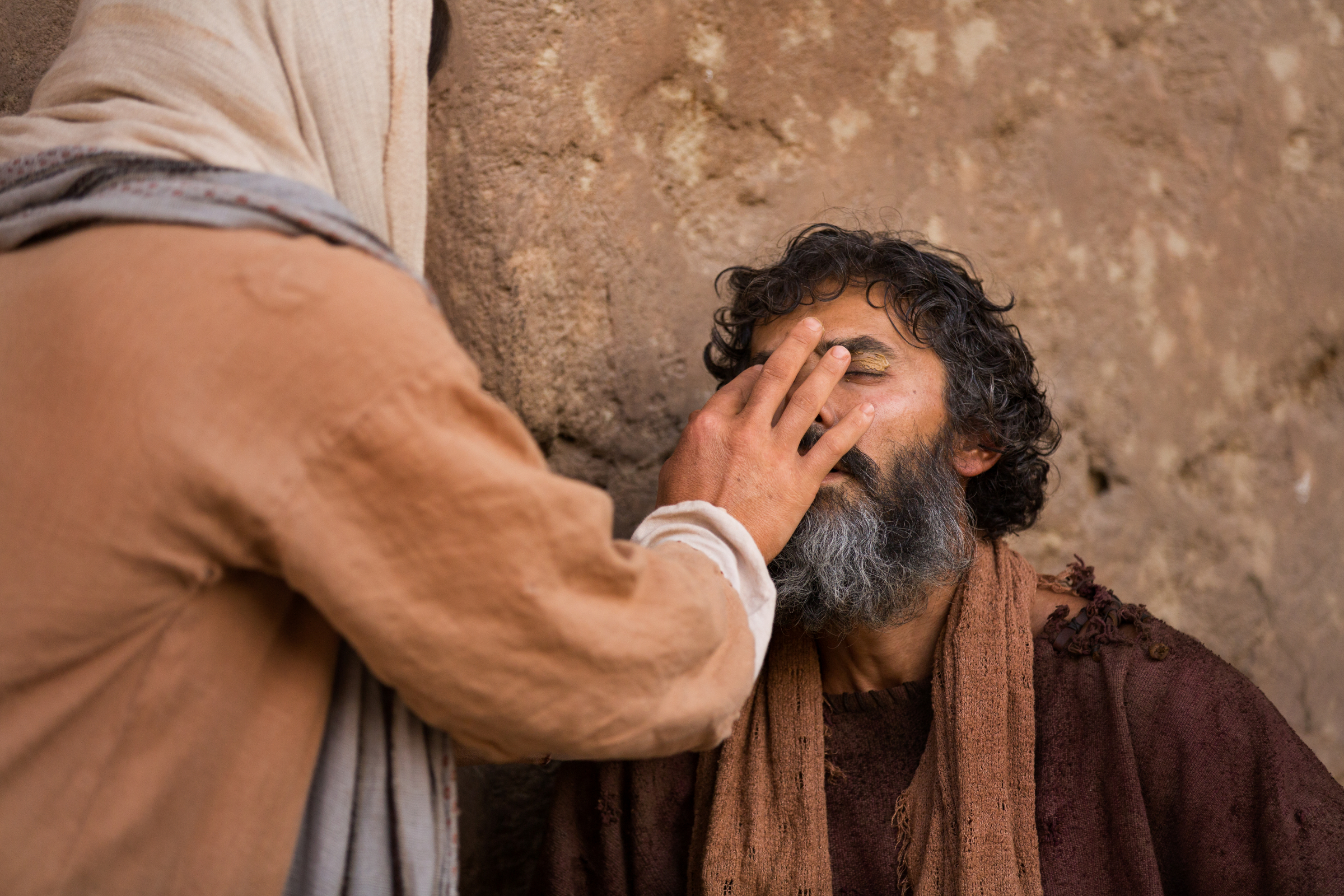
Now the Jews did not believe
that he had been blind and gained his sight
until they summoned the parents of the one who had gained his sight.
They asked them,
“Is this your son, who you say was born blind?
How does he now see?”
His parents answered and said,
“We know that this is our son and that he was born blind.
We do not know how he sees now,
nor do we know who opened his eyes.
Ask him, he is of age;
he can speak for himself.”
His parents said this because they were afraid
of the Jews, for the Jews had already agreed
that if anyone acknowledged him as the Christ,
he would be expelled from the synagogue.
For this reason his parents said,
“He is of age; question him.”
So a second time they called the man who had been blind
and said to him, “Give God the praise!
We know that this man is a sinner.”
He replied,
“If he is a sinner, I do not know.
One thing I do know is that I was blind and now I see.”
So they said to him,
“What did he do to you?
How did he open your eyes?”
He answered them,
“I told you already and you did not listen.
Why do you want to hear it again?
Do you want to become his disciples, too?”
They ridiculed him and said,
“You are that man’s disciple;
we are disciples of Moses!
We know that God spoke to Moses,
but we do not know where this one is from.”
The man answered and said to them,
“This is what is so amazing,
that you do not know where he is from, yet he opened my eyes.
We know that God does not listen to sinners,
but if one is devout and does his will, he listens to him.
It is unheard of that anyone ever opened the eyes of a person born blind.
If this man were not from God,
he would not be able to do anything.”
They answered and said to him,
“You were born totally in sin,
and are you trying to teach us?”
Then they threw him out.
When Jesus heard that they had thrown him out,
he found him and said, “Do you believe in the Son of Man?”
He answered and said,
“Who is he, sir, that I may believe in him?”
Jesus said to him,
“You have seen him,
the one speaking with you is he.”
He said,
“I do believe, Lord,” and he worshiped him.
Then Jesus said,
“I came into this world for judgment,
so that those who do not see might see,
and those who do see might become blind.”
Some of the Pharisees who were with him heard this
and said to him, “Surely we are not also blind, are we?”
Jesus said to them,
“If you were blind, you would have no sin;
but now you are saying, ‘We see,’ so your sin remains.
or
Jn 9:1, 6-9, 13-17, 34-38
As Jesus passed by he saw a man blind from birth.
He spat on the ground and made clay with the saliva,
and smeared the clay on his eyes,
and said to him,
“Go wash in the Pool of Siloam” — which means Sent —.
So he went and washed, and came back able to see.
His neighbors and those who had seen him earlier as a beggar said,
“Isn’t this the one who used to sit and beg?”
Some said, “It is, “
but others said, “No, he just looks like him.”
He said, “I am.”
They brought the one who was once blind to the Pharisees.
Now Jesus had made clay and opened his eyes on a sabbath.
So then the Pharisees also asked him how he was able to see.
He said to them,
“He put clay on my eyes, and I washed, and now I can see.”
So some of the Pharisees said,
“This man is not from God,
because he does not keep the sabbath.”
But others said,
“How can a sinful man do such signs?”
And there was a division among them.
So they said to the blind man again,
“What do you have to say about him,
since he opened your eyes?”
He said, “He is a prophet.”
They answered and said to him,
“You were born totally in sin,
and are you trying to teach us?”
Then they threw him out.
When Jesus heard that they had thrown him out,
he found him and said, “Do you believe in the Son of Man?”
He answered and said,
“Who is he, sir, that I may believe in him?”
Jesus said to him,
“You have seen him, and
the one speaking with you is he.”
He said,
“I do believe, Lord,” and he worshiped him.
